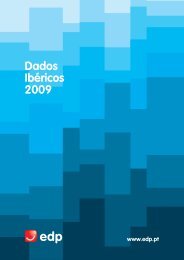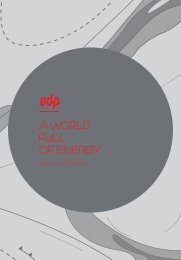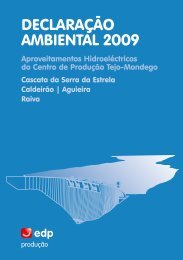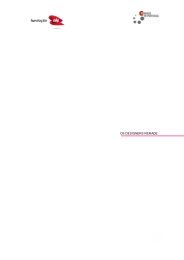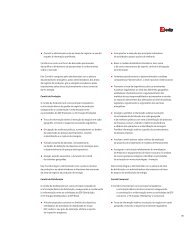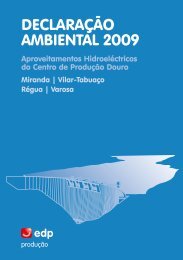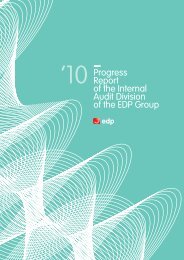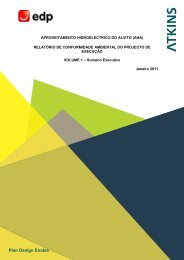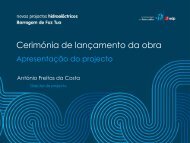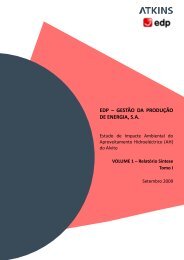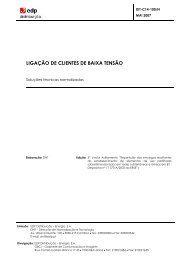business plan for 2004 - EDP
business plan for 2004 - EDP
business plan for 2004 - EDP
Create successful ePaper yourself
Turn your PDF publications into a flip-book with our unique Google optimized e-Paper software.
Subsequently, on June 23, 2000, Royal Decree-Law 6/2000<br />
was published with a view to the introduction of urgent<br />
measures designed to increase competition in the natural<br />
gas sector, particularly:<br />
• Simplifying the entry of new sellers;<br />
• Introducing a new entity into the structure of the sector,<br />
known as the System Manager, charged with managing<br />
75% of the gas arriving from Algeria via the Maghreb<br />
pipeline to meet the requirements of tariff customers;<br />
• Establishing the date of January 1, 2003, <strong>for</strong> liberalisation<br />
<strong>for</strong> all consumers; and<br />
• Reducing to the end of 2005 the period of exclusivity<br />
<strong>for</strong> distributors in a given geographic zone.<br />
Lastly, on December 27, 2002, Royal Decree-Law<br />
1434/2002 was published, governing the transport,<br />
distribution and selling activities, supplies and natural<br />
gas installation licensing procedures.<br />
Other sundry legislation completed the legal framework<br />
of the industry, defining procedures <strong>for</strong> the auction of the<br />
remaining 25% of the gas from Algeria (ministerial order<br />
of June 29, 2001), the remuneration <strong>for</strong> regulated activities<br />
within the sector (ministerial order ECO/301/2002 of<br />
February 15), gas supply tariffs (ministerial order<br />
ECO/302/2002 of February 15) and the tolls due on thirdparty<br />
access to the gas installations (ministerial order<br />
ECO/303/2002 of February 15).<br />
At the end of the first year of liberalisation of the gas<br />
sector <strong>for</strong> all consumers, the Spanish government<br />
published, early in <strong>2004</strong>, Order ECO/31/<strong>2004</strong> of January<br />
15, updating the remuneration of the regulated activities<br />
of the gas sector in <strong>2004</strong>.<br />
>> 1.2.2 Position of the <strong>EDP</strong> Group<br />
Throughout 2003 <strong>EDP</strong>, through the group of companies<br />
controlled by HidroCantábrico, extended the scope of its<br />
<strong>business</strong> on the Spanish market, making progress in its<br />
mission of becoming an Iberian operator.<br />
Because of its approximate size five to six times that of<br />
the Portuguese market, <strong>for</strong> its dynamics and <strong>for</strong> the<br />
geographic continuity that it represents <strong>for</strong> <strong>EDP</strong>, the<br />
Spanish market is a natural area of expansion of the<br />
Group’s <strong>business</strong>, more so since the constitution is<br />
imminent of MIBEL, to which both the Portuguese and<br />
the Spanish governments are firmly committed.<br />
The 40% holding in HidroCantábrico has allowed <strong>EDP</strong> to<br />
get ahead and to adapt to the scenarios of evolution to<br />
MIBEL since it is the only Iberian electricity company that<br />
has acquired operating experience on both sides of the<br />
border. Emphasis is given to the Group’s capabilities in<br />
managing flows of electricity at Iberian / cross-border<br />
2003 - Annual Report - <strong>EDP</strong><br />
level, and at the same time is aligned with the specific<br />
regulatory characteristics of each country.<br />
The solidity of <strong>EDP</strong>’s position in the future Iberian<br />
electricity market also lies in the complementary nature<br />
of the portfolios of assets of HidroCantábrico and of <strong>EDP</strong>.<br />
Since HidroCantábrico’s production is mainly of thermal<br />
origin (85% of gross generation in 2003), there is a natural<br />
cover of the rainfall risk that affects the country’s<br />
generation, allowing annual generation quotas to be met<br />
both in dry and in wet years. The complementary nature<br />
of the <strong>EDP</strong> / HidroCantábrico relationship is also clear to<br />
see in <strong>EDP</strong>’s longer tradition in supply than in<br />
production, the reverse of HidroCantábrico’s position.<br />
Parallelism between the strategic options adopted by <strong>EDP</strong><br />
in Portugal and by HidroCantábrico in Spain underpins<br />
the intensification of the Iberian role. In this connection<br />
one should point out the increase of the<br />
HidroCantábrico’s position in the gas sector resulting<br />
from the acquisition of a 62% stake in NaturCorp. This<br />
was the biggest goal that was reached in Spain during<br />
2003 and it allowed HidroCantábrico to become the<br />
second biggest Spanish company operating in the gas<br />
distribution <strong>business</strong>. As in Portugal, HidroCantábrico<br />
recognises that bringing together the gas and electricity<br />
<strong>business</strong>es adds value to the companies both in the<br />
generation and in the distribution and supply areas.<br />
There are other symmetries between the positions of <strong>EDP</strong><br />
in Portugal and of HidroCantábrico in Spain that<br />
themselves strengthen the Iberian role. These include the<br />
progressive use of natural gas as the fuel preferred in<br />
increasing generation capacity, <strong>for</strong> reasons to do with<br />
economy, the environment and diversification of the<br />
sources of primary energy, and the focus on the<br />
renewable energies sector, taking advantage of the<br />
conditions created by the establishment of special regimes<br />
governing the remuneration of investment in<br />
infrastructure of this kind.<br />
Lastly, we would call attention to the fact that, in<br />
September, the Council of Ministers of the Spanish<br />
government lifted the inhibition of <strong>EDP</strong>’s voting rights in<br />
HidroCantábrico.





